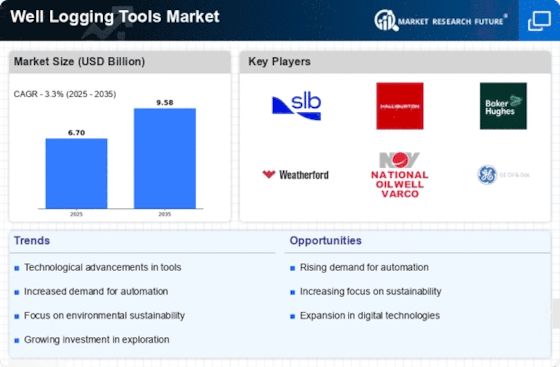Top Industry Leaders in the Logging Tools Market
*Disclaimer: List of key companies in no particular order
Top listed global companies in the Well Logging Tools industry are:
Halliburton
Royal Dutch Shell
Schlumberger
Baker Hughes
GE Company
Weatherford
Hunting Energy Services
Gowell International LLC
TSL Technology Ltd.
BÖHLER Edelstahl GmbH & Co KG
ANTARES Datensysteme GmbH.
Bridging the Gap by Exploring the Competitive Landscape of the Well Logging Tools Top Players
The well logging tools market navigates a dynamic landscape, shaped by the constant pursuit of optimizing reservoir characterization and maximizing operational efficiency. Major players like Schlumberger, Halliburton, Baker Hughes, and Weatherford have long dominated the scene, wielding established technologies and extensive global reach. However, the terrain is far from static, with smaller players carving niches through unique specializations and emerging trends like AI-powered interpretation and real-time data analysis shaking up the established order.
Key Player Strategies:
Technology Acquisition and Diversification: Industry giants are actively acquiring promising startups and investing in R&D to bolster their portfolios with next-generation tools. Schlumberger's acquisition of WellCAD and Halliburton's investment in AI-powered reservoir modeling software are prime examples.
Geographical Expansion and Market Penetration: Established players leverage their global networks to enter high-growth emerging markets like the Middle East and Asia Pacific, while also consolidating their hold in mature markets through strategic partnerships and localized service offerings.
Focus on Service Integration and Data Analytics: Moving beyond mere tool provision, companies are increasingly offering integrated data analysis and interpretation services, leveraging expertise and AI to extract actionable insights from complex logging data.
Factors for Market Share Analysis:
Product Portfolio Breadth and Depth: The ability to offer a comprehensive suite of tools catering to diverse well types, formations, and logging requirements plays a crucial role. Companies like Baker Hughes, with their strong presence in formation evaluation and directional drilling tools, hold a strategic advantage.
Technological Innovation and Differentiation: Pioneering advancements in areas like real-time data transmission, formation pressure measurement, and downhole fluid analysis can create significant competitive advantages. Weatherford's focus on fiber-optic logging and real-time reservoir monitoring exemplifies this approach.
Geographical Presence and Market Penetration: Strong footholds in key oil and gas producing regions, coupled with established relationships with regional players, translate to robust market share. Schlumberger's extensive global network and long-standing partnerships in the Middle East are a testament to this.
Customer Service and After-Sales Support: Responsive and reliable customer service, including efficient maintenance and equipment upgrades, fosters customer loyalty and brand preference. Halliburton's emphasis on post-purchase support and training programs is a noteworthy strategy.
New and Emerging Trends:
Artificial Intelligence (AI) and Machine Learning (ML) Integration: AI-powered data interpretation, automated anomaly detection, and real-time reservoir modeling are reshaping the market. Companies like ANTARES Datensysteme are leading the charge with their AI-driven log interpretation software.
Cloud-Based Data Management and Collaboration: Secure cloud platforms for storing, analyzing, and sharing well logging data are gaining traction, enabling remote collaboration and efficient decision-making. Schlumberger's Petrel platform and Halliburton's Landmark software are prominent examples.
Focus on Environmental Sustainability: Development of eco-friendly logging tools and materials, reduced energy consumption during operations, and minimizing waste generation are becoming key differentiators. Baker Hughes' focus on electric wireline logging and Schlumberger's commitment to bio-based lubricants showcase this trend.
Overall Competitive Scenario:
The well logging tools market is witnessing a dynamic interplay of established giants and nimble innovators. While larger players leverage their vast resources and global reach, smaller companies are carving niches through specialized offerings and cutting-edge technologies. The integration of AI, cloud-based solutions, and sustainability-focused innovations is reshaping the competitive landscape, demanding continuous adaptation and strategic agility from all players. The future of the market is likely to be defined by who can best integrate advanced technologies, deliver comprehensive data-driven insights, and operate with agility and environmental consciousness.
Latest Company Updates:
Halliburton:
- October 26, 2023: Announced launch of the iLog-X, an AI-powered well logging platform that integrates data from various sensors for enhanced reservoir characterization and fluid identification. (Source: Halliburton press release)
Royal Dutch Shell:
- December 14, 2023: Announced collaboration with Schlumberger on the development of next-generation logging tools utilizing machine learning for real-time reservoir insights. (Source: Shell website)
Schlumberger:
- January 10, 2024: Acquired Expro International, a leading provider of well testing and production services, expanding its well logging capabilities. (Source: Schlumberger press release)
Baker Hughes:
- December 8, 2023: Launched the Veracity* intelligent completion system with advanced downhole sensors for real-time reservoir monitoring and optimization. (Source: Baker Hughes press release)
GE Company:
- October 5, 2023: Announced the launch of the Predix Well Performance Management platform for integrated well data management and optimization across the entire lifecycle. (Source: GE Reports)










